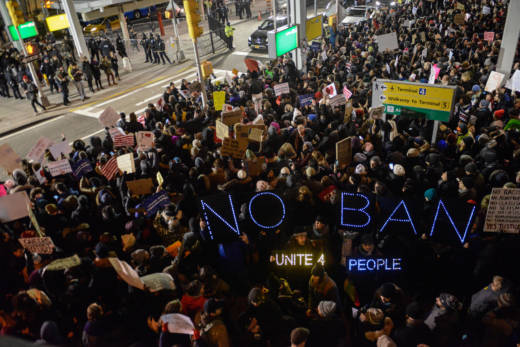Two of the first people blocked from entering the United States were Iraqis with links to the U.S. military. Hameed Khalid Darweesh and Haider Sameer Abdulkhaleq Alshawi were detained by immigration officials after landing at New York’s Kennedy airport Friday night.
The ACLU’s habeas corpus petition, upon which Donnelly acted, was filed on their behalf, and both had been released by Saturday night.
The government can exempt foreign nationals from the ban if their entry is deemed in the national interest. But it was not immediately clear how that exemption might be applied.
Diplomats from the seven countries singled out by Trump’s order would still be allowed into the U.S.
Those already in the U.S. with a visa or green card would be allowed to stay, according to the official, who wasn’t authorized to publicly discuss the details of how Trump’s order was being put in place and spoke only on condition of anonymity.
Trump’s order also directed U.S. officials to review information as needed to fully vet foreigners asking to come to the U.S. and draft a list of countries that don’t provide that information. That left open the possibility that citizens of other countries could also face a travel ban.
The U.S. may still admit refugees on a case-by-case basis during the freeze, and the government would continue to process requests from people claiming religious persecution, “provided that the religion of the individual is a minority religion in the individual’s country.”
The Council on American-Islamic Relations said it would challenge the constitutionality of Trump’s order.
“There is no evidence that refugees — the most thoroughly vetted of all people entering our nation — are a threat to national security,” said Lena F. Masri, the group’s national litigation director. “This is an order that is based on bigotry, not reality.”
John Cohen, a former Department of Homeland Security counterterrorism official who worked under Democratic and Republican administrations, said the order didn’t address America’s “primary terrorism-related threat” — people already in the U.S. who become inspired by what they see on the internet.
Trump’s order drew support from some Republican lawmakers who have urged more security measures for the refugee vetting program, particularly for those from Syria.
“We are a compassionate nation and a country of immigrants. But as we know, terrorists are dead set on using our immigration and refugee programs as a Trojan Horse to attack us,” House Homeland Security Committee Chairman Michael McCaul said in a statement Friday. “With the stroke of a pen, he is doing more to shut down terrorist pathways into this country than the last administration did in eight years.”
It is unclear how many people would be immediately impacted by the non-refugee travel ban. According to the statistics maintained by the Homeland Security Department, about 17,000 students from the seven designated countries were allowed into the U.S. for the 2015-2016 school year. In 2015 more than 86,000 people from those countries arrived in the U.S. on other, non-immigrant visas and more than 52,000 others became legal permanent residents.
Last year the U.S. resettled 85,000 people displaced by war, political oppression, hunger and religious prejudice, including more than 12,000 Syrians. Before leaving office President Barack Obama announced that the U.S. would accept 110,000 refugees in the coming year, but Trump’s order cut that by more than half to 50,000.
Associated Press writers Darlene Superville and Eric Tucker in Washington, Ellen Knickmeyer in San Francisco, Jeff Karoub in Detroit, and Karen Matthews, Rachel Zoll, Verena Dobnik and William Mathis in New York contributed to this report.

